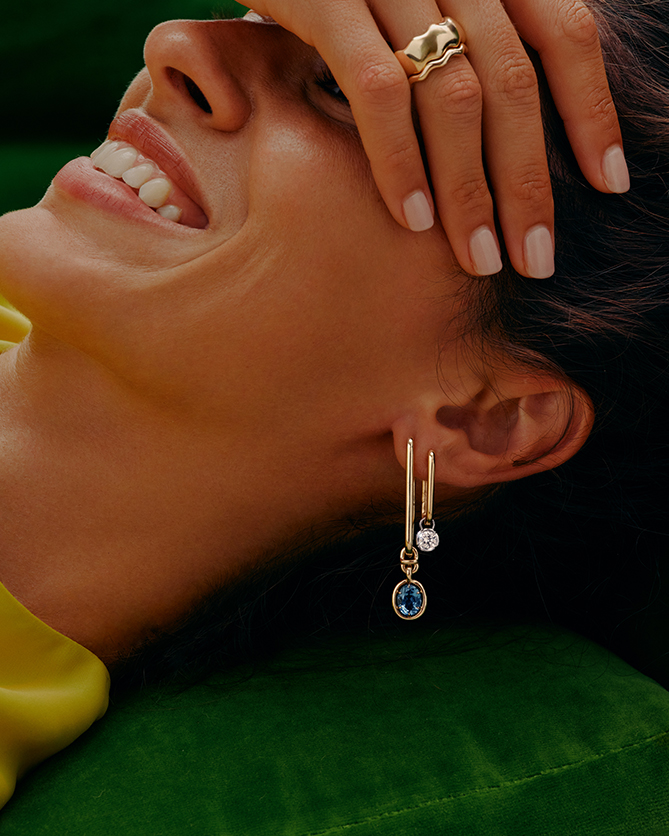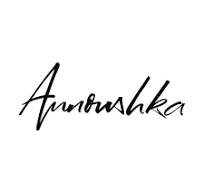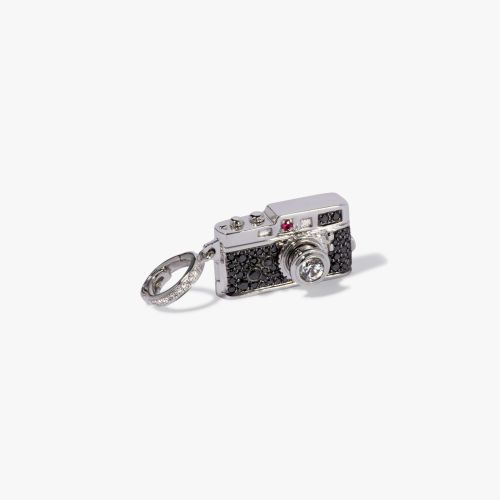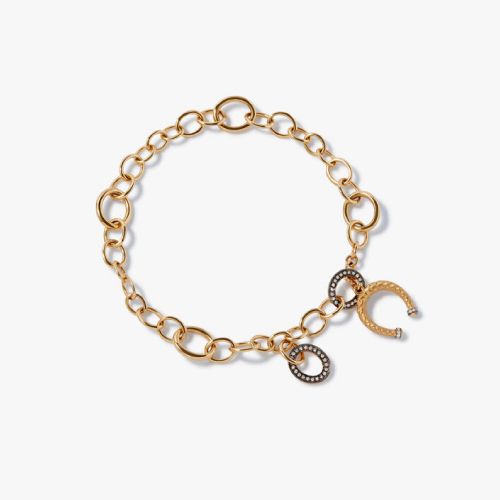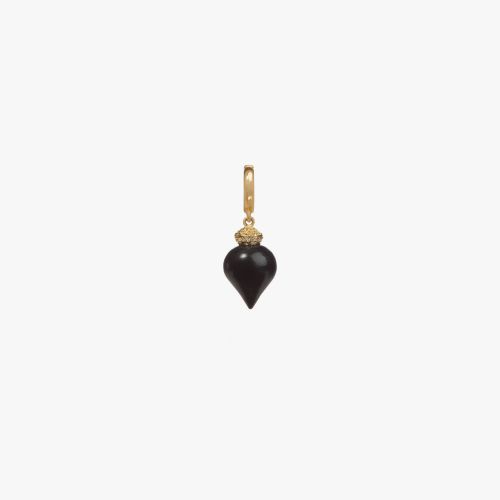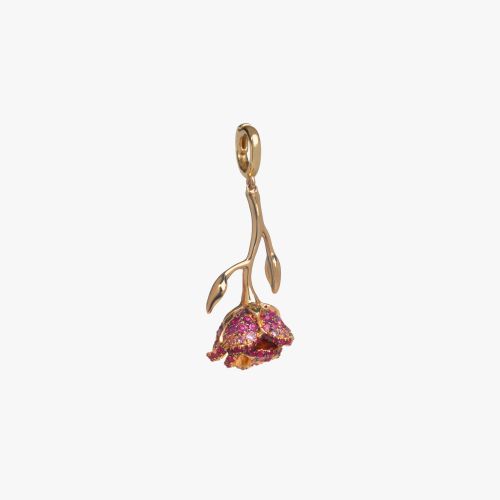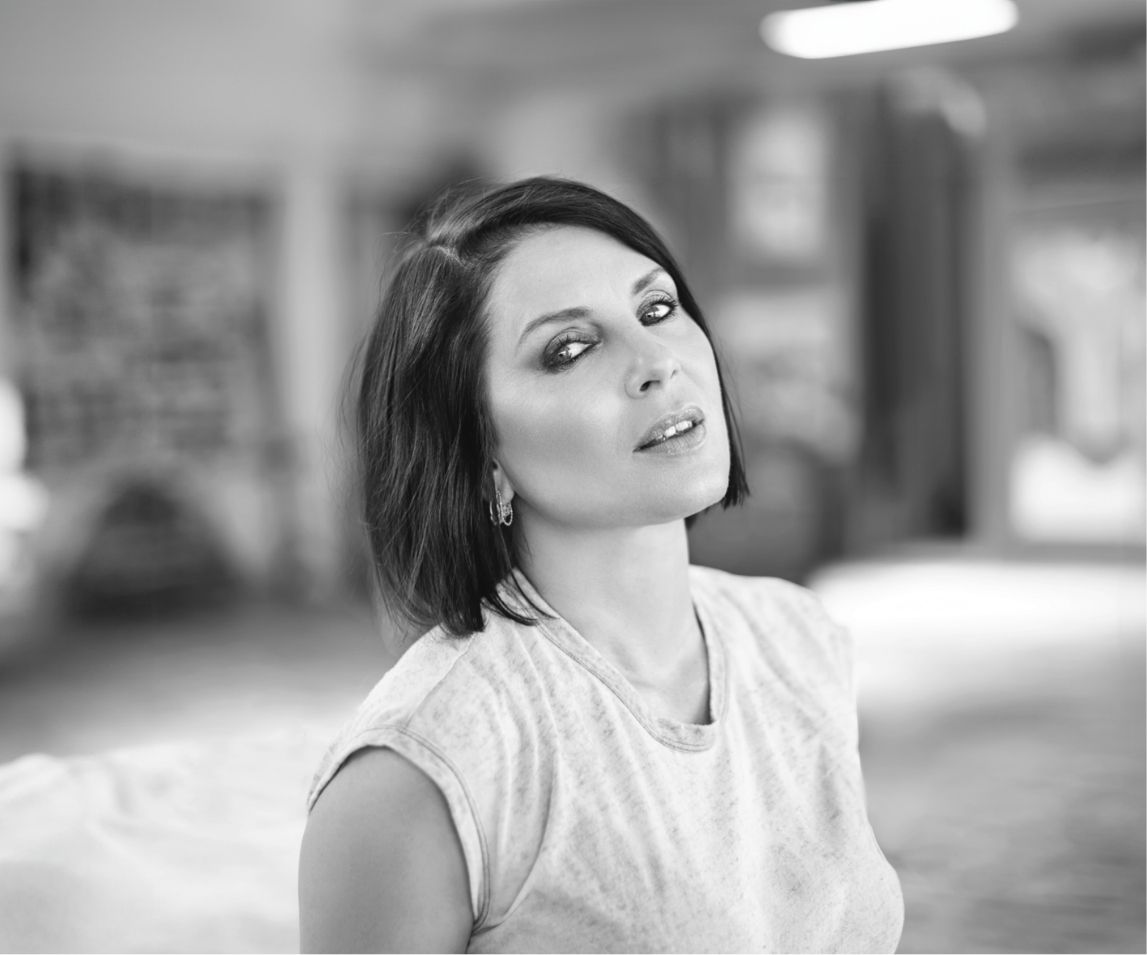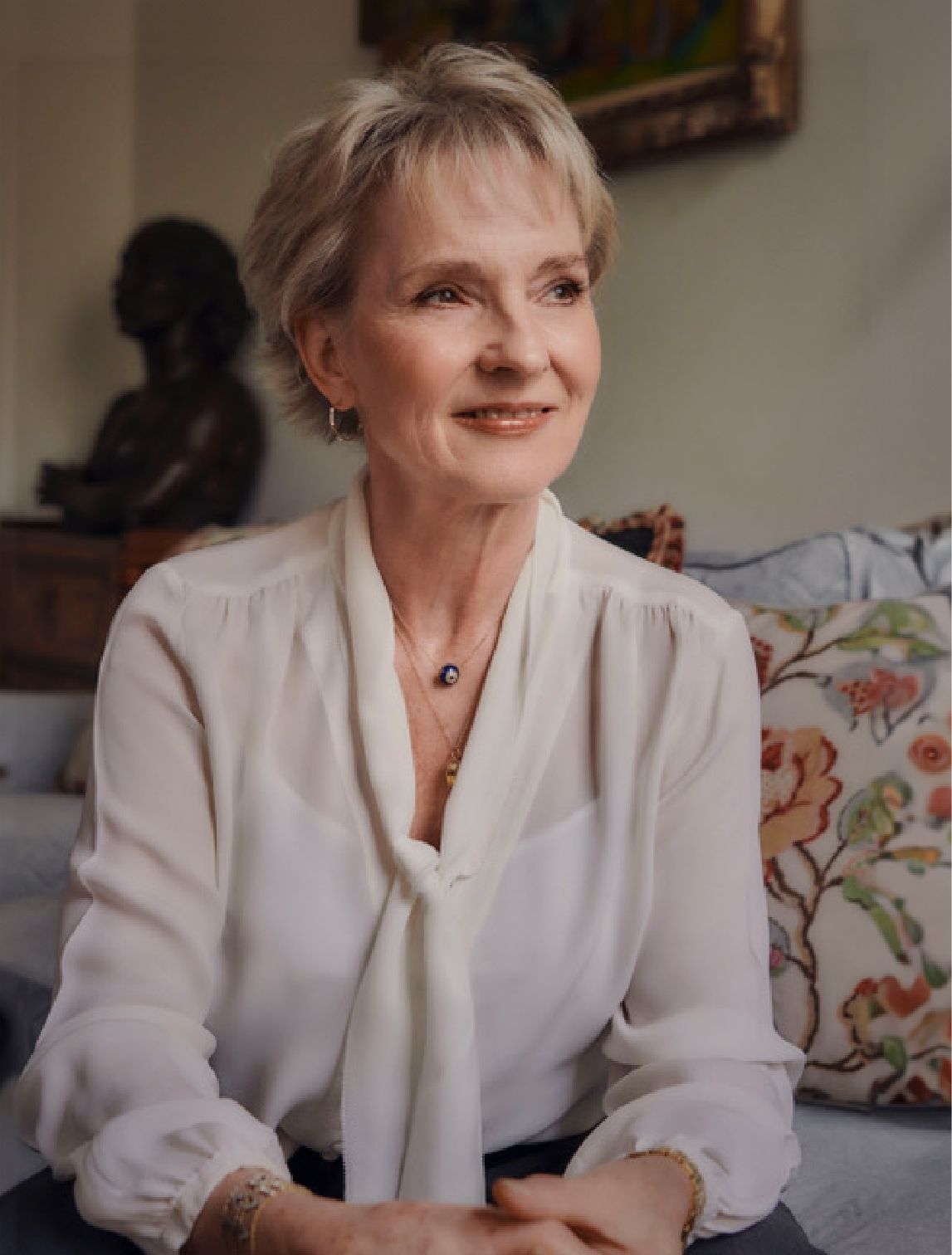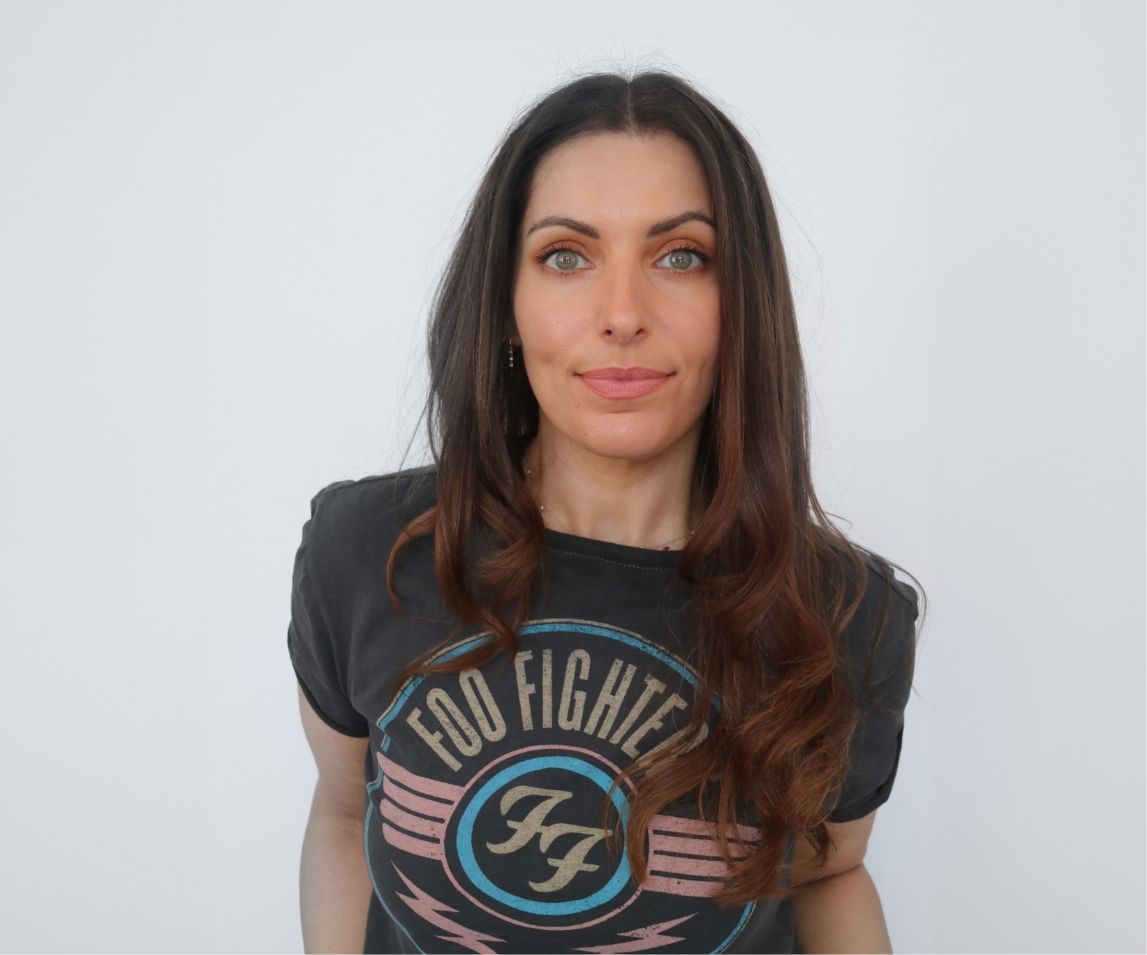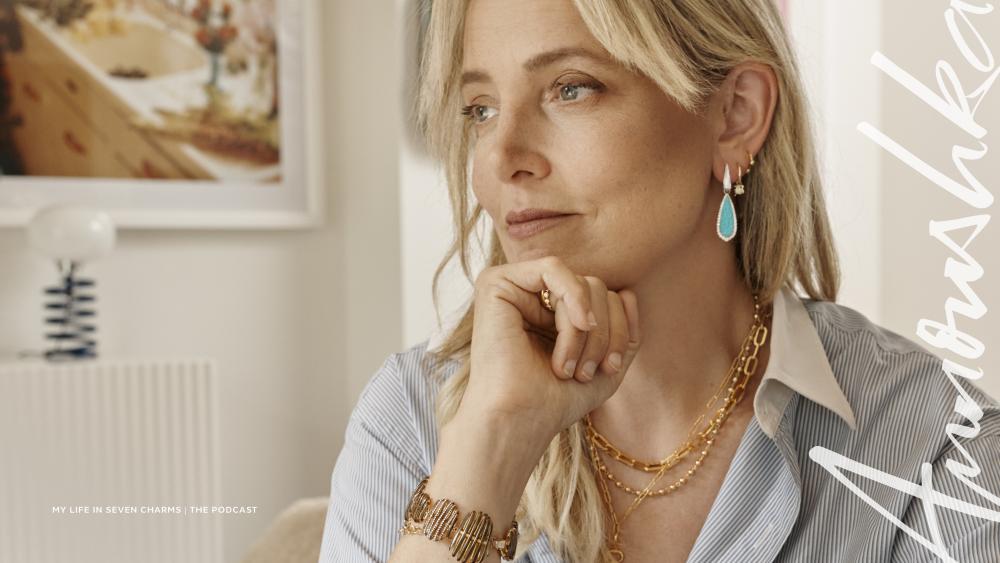
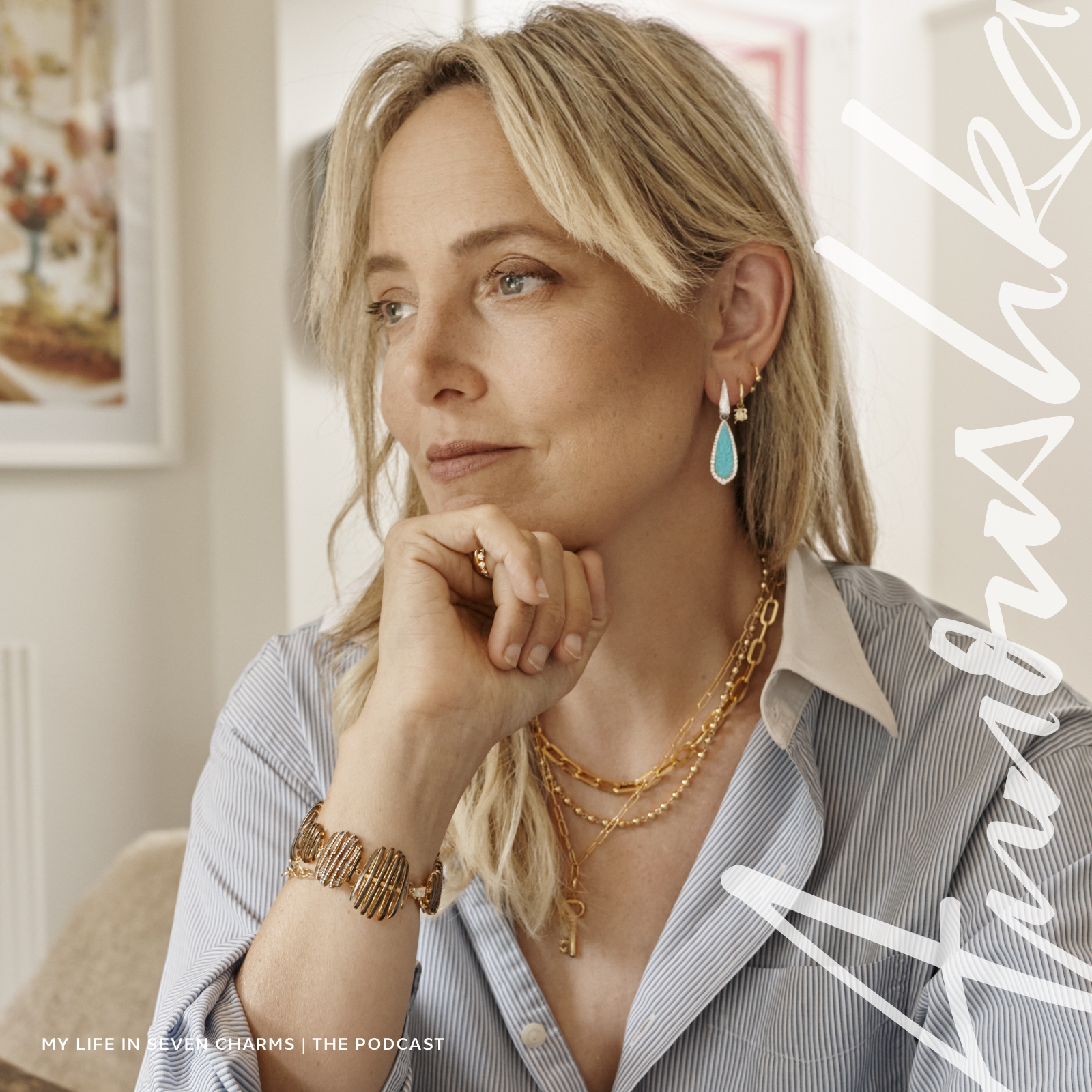
Read the podcast
Annoushka Ducas:
I am Annoushka Ducas, and welcome back to My Life in Seven Charms. For me, there are so few things which can evoke a memory like a tiny detail
In this new series, I'll be meeting seven extraordinary women and hearing their stories through this very special 18 karat gold biography. In today's episode, we'll be meeting stylist and thrifting pioneer, Bay Garnett.
Bay Garnett:
I was on the Upper East Side in New York and I went into my favourite cancer care, and on the rail to go was this amazing banana print top with big leaves, and to cut a long story short, I used that top on Kate Moss, and Juergen Teller shot it. So, that banana top, when we talk about stories, it's had a real story.
Annoushka Ducas:
Today I'm in West London, which I'm really excited about, because I'm going to see Bay Garnett, and I'm not going to do it on Zoom, so I'm really looking forward to meeting her. Bay is a stylist and creative director, who has been called the Queen of Thrift. Long before the fashion industry woke up to sustainability, she was a trail blazer, rebelling against the fashion establishment by combining second hand finds with couture. She has that most unusual quality, the restless eye of a maverick. Welcome, Bay, to My Life in Seven Charms.
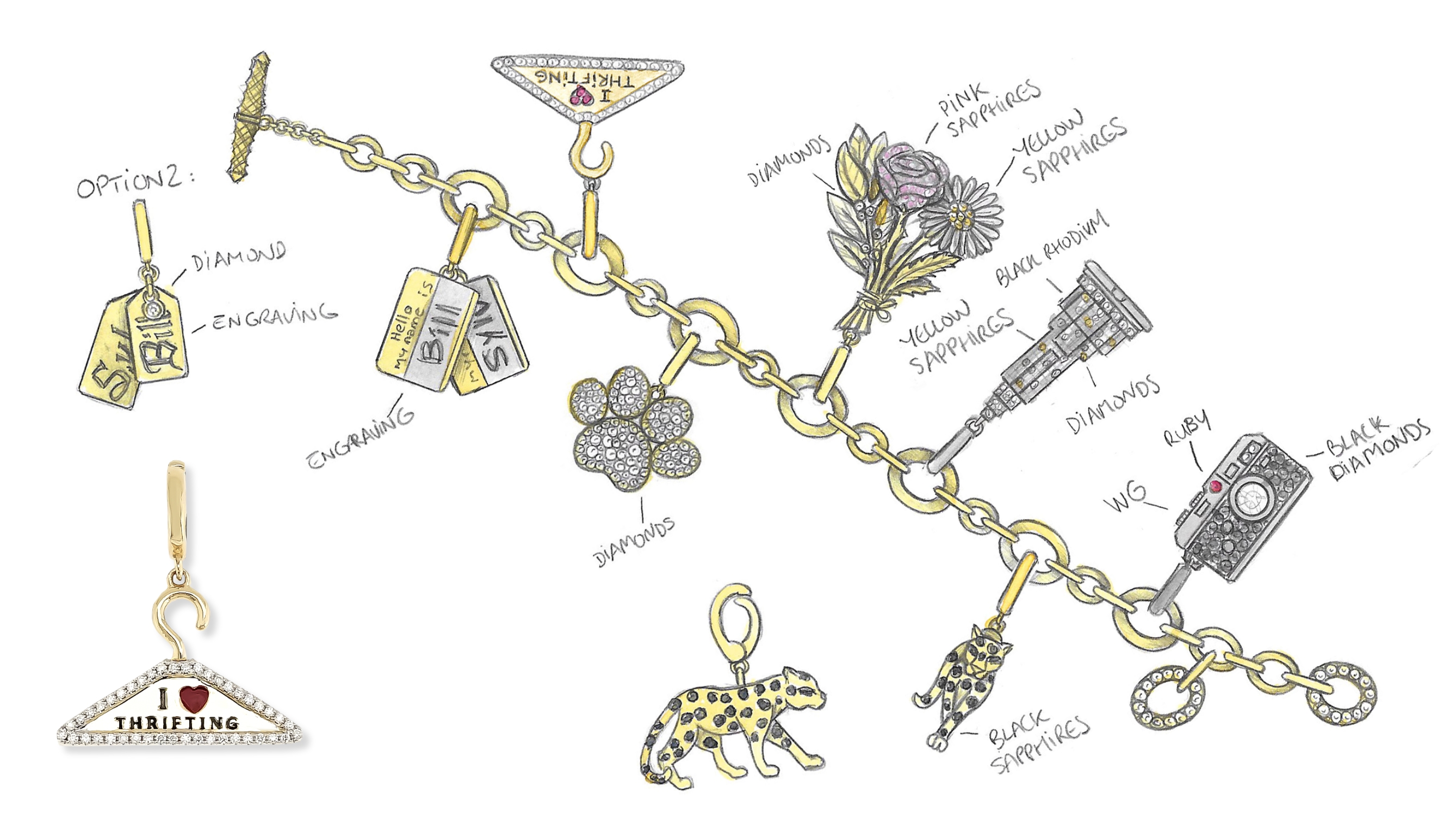
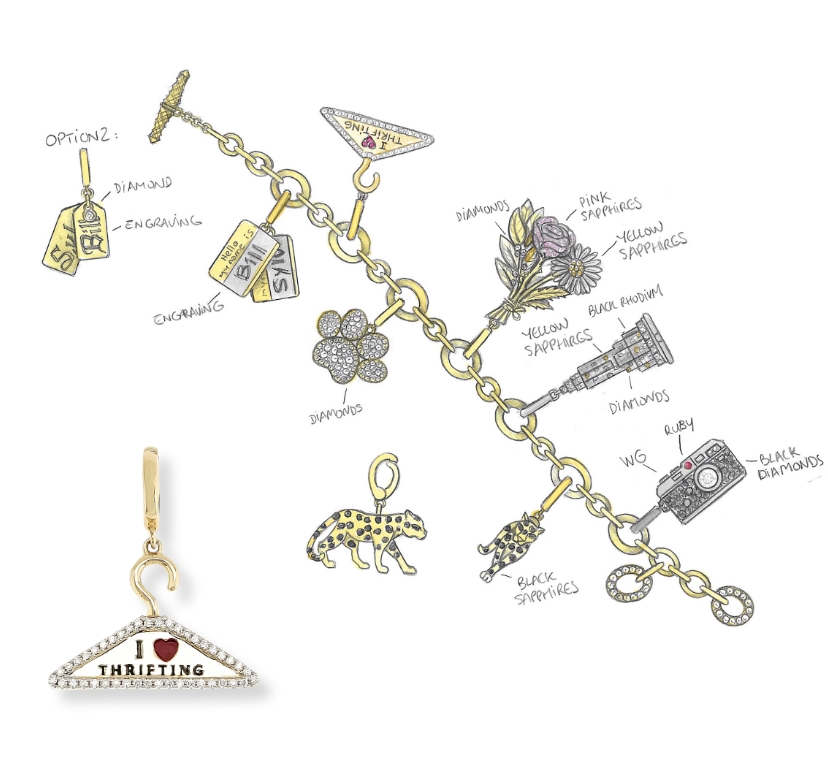
Annoushka Ducas:
Bay, it's so lovely to be here.Thank you so much.
Bay Garnett:
Oh, thank you.
Annoushka Ducas:
The first thing that stopped me when I came in-
Bay Garnett:
[crosstalk 00:01:32]
Annoushka Ducas:
Leopard skin. It's fantastic.
Bay Garnett:
Which I always forget is there now because it's become-
Annoushka Ducas:
Part of your-
Bay Garnett:
Yeah. When people go, your stairs, and I'm, "Oh yeah." I just think of them always being plain.
Annoushka Ducas:
Oh no. I absolutely love that.
Bay Garnett:
I do.
Annoushka Ducas:
This is just a sketch of the charms that we're going to talk about.
Bay Garnett:
Oh! They're gorgeous.
Annoushka Ducas:
Well first of all, I've just got to tell you that, of all my guests, you are the only person that's described your charms the way you saw them or might've seen them, in the detail that you did. I was like, "She's definitely a stylist. Definitely knows what she wants."
Bay Garnett:
Such a nice thing to think about.
Annoushka Ducas:
The other thing is, you may be Queen of Thrift, but you have bloody expensive taste. You've got a lot of diamonds-
Bay Garnett:
Diamonds.
Annoushka Ducas:
... going on in here. So, every anyway... I've tried not to put diamonds all over everything, but look, your first charm, I love this charm. You said, wire hanger. When you described it, you said, "I want it to be like a kind of New York dry cleaner coat hanger." So, I've done it in
for the actual shape of the coat hanger, but it's solid yellow gold and it opens, so it's a
so you can put something inside it, but on the edge is, you'll be pleased to hear, awesome pavé diamonds.
Bay Garnett:
Woo!
Annoushka Ducas:
To kind of have the outline of the coat hanger. And then, we've engraved in the middle, I heart, and I think heart should be a little ruby or cabochon
Bay Garnett:
I'm so fine with a ruby.
Annoushka Ducas:
You're fine with a ruby. But I think it should be, I heart thrifting. You can see on the other side, it's got, what are these three areas? What are they called? Sustainability-
Bay Garnett:
Recycle, circular.
Annoushka Ducas:
Exactly. So I've engraved that on the back, and it opens. It's a locket, so you can put something in it. I just love it so much. I'm so glad. Well, I obviously, Queen of Thrifting, tell me about the coat hanger.
Bay Garnett:
Well, the coat hanger really comes from, I suppose, when I would go thrifting in New York to the Salvation Army and Goodwill and all the uptown thrift stores. I would actually wear it straight from the shop, but then I would get it dry cleaned and the hanger really, is about going to pick it up in my local dry cleaner and the paper around the hanger would have the paper, and it would say, I love, I heart NY, and so for me, I guess it's a souvenir, not just of the actual clothes of city life, but also of, well, New York thrifting, which is where I really became so passionate about it. It really encompasses a lot, that coat hanger.
Annoushka Ducas:
I can see. I love that.
Bay Garnett:
For me.
Annoushka Ducas:
For those of us that, perhaps, don't know the difference, is there a difference between thrifting and secondhand?
Bay Garnett:
Well, thrifting is really the act of rummaging, the act of looking through secondhand, and thrifting isn't vintage shopping. Thrifting is really an American term. In England, you'd say, charity shopping, but I guess, I love the thing of thrifting. It's a great word. So for me, yes, it's the same as secondhand in as much as, you're going to the kind of sources charity shopping as opposed to buying vintage online or it's kind of the real grassroots of it.
Annoushka Ducas:
I love the way you are doing it. I love the way you feel like you are rummaging. When did you start getting into secondhand? What brought it on?
Bay Garnett:
That's a good question. I started so long ago. I just always loved, I grew up near Bath, actually in Somerset, actually just outside Bruton, and there were loads of local towns, and I used to go out to all the local villages. My mother always was a collector, so right from when I was young, we'd always stop off at junk shops, and when we'd go back to Ireland, she would stop off at the tinker's yard, so I suppose it was always that thing of accumulative stuff, but doing it in a way where you were finding stuff and it was cheaper, and it was your find.
Annoushka Ducas:
So, Bay, if you come with me, which it'd be great if you did, to a secondhand shop, if I said, "Look, I want to buy a dress," that's it. That's your brief. What would you, where would you, how would you help me get my eye in? If you were with me, it'd be fine but...
Bay Garnett:
Well, I do go thrifting with friends who aren't really into it, and most of the time, or don't really do it that much, and most of the time, kind of end up having a laugh and loving it. I suppose, what I would do is, I would look for a dress, might not find the dress, but I would hold up something else, and I think that the main thing I would say is that, it's about having fun, and within that, you will find something or you might find something that might not be your dress, but something really good. So, that would be my tip, would be to just go in with something and then, be open to suggestion, be open to fun, and you'll probably find something that you do really like that might surprise you, but it might not be the dress.
Annoushka Ducas:
I've got lots of it, but it's just like, and then you're going to work at how to put it altogether, but that's where you come in.
Bay Garnett:
But I bet you'll [inaudible 00:07:17], as the jewelry that you... that's the joy that you do with the charms. I love the idea of you loving copy sales where it's so arbitrary in terms of an object that's quite obscure, turning that into something miniature and jewel-like. It's kind of fun.
Annoushka Ducas:
Well, that's just a kind of genesis of an idea of something, whether it's a light that's fallen off a car or... it's fun. So, I so get the excitement-
Bay Garnett:
It's the same thing as that.
Annoushka Ducas:
I really get it, but out of interest, is there anything about it that's about the life the piece of clothing has had before?
Bay Garnett:
Oh yeah, definitely. For me, it's just so much about storytelling and the stories around it, and actually, I wrote something. I wrote a little article yesterday about that. A Sunday Times style about my find that I... the one thing I would've kept. My favorite thrift store find, and I always wonder about that. I think, oh, who had this? Not always, but if it's a certain piece, and actually, Rachel Weisz was saying that, one of the reasons she loves secondhand clothes so much is the stories around it, like the movies, and it's that same thing of clothes having these stories around them. If you're into secondhand clothes, then the idea of those stories are intrinsic to enjoying all of it.
Annoushka Ducas:
Yeah, it's like the jewellery is like that. I think there's so many parallels because jewelry-
Bay Garnett:
Jewelry is so like that.
Annoushka Ducas:
... is all about the narrative. So, when somebody finds this charm bracelet in X years, it will tell the story, or even anything.
Bay Garnett:
Gosh, you say that, and absolutely, jewelry probably even more so than clothes in some ways. Edwardian ring, who wore that? It's very clear.
Annoushka Ducas:
Even the markings on the gold, it's like, oh, God, it's had a real life, hasn't it? I so get it. Now, I've got to ask. Have you got a favorite secondhand shop in the whole world or are you going to tell us?
Bay Garnett:
Oh, gosh. It would be in New York. It would be one of the ladies who lunch on the upper east side.
Annoushka Ducas:
Right.
Bay Garnett:
I think maybe, the Council Thrift Store where these old ladies work and you walk in, and you look a bit disheveled, and they look at you like, you're really nuts. You don't look smart at all, you need to come and clean, and I love them, and I love... and I found amazing things from there. So, the upper east side thrift stores, I absolutely love. In London, a really good tip, I think, is the British Red Cross in Chelsea is great, on Church Street.
Annoushka Ducas:
Oh right, by the old cinema.
Bay Garnett:
Exactly. It's quite good to think about locations. There, in Chelsea, you get some of the old ladies who give their old [inaudible 00:10:11], that they haven't worn for 40 years. Not that often, but it happens, and that's the chance. That's the fun of it, so that's a really good one.
Annoushka Ducas:
That is a really good tip, actually. You're very right, it's a really good tip. Actually, it's so funny you say that because I bought a piece of jewelry, junk jewelry fatally, in that Chelsea store-
Bay Garnett:
Did you?
Annoushka Ducas:
And it started the idea for a collection. It was about 10 years ago.
Bay Garnett:
Wow.
Annoushka Ducas:
But isn't that so funny?
Bay Garnett:
What was it? What was the piece?
Annoushka Ducas:
It was a Van Straeten choker and it was quite big, all brass, giant like that, and all the things turned and moved. Anyway, I still have it.
Bay Garnett:
Wow.
Annoushka Ducas:
It looked great with a beach dress or summer [inaudible 00:10:57].
Bay Garnett:
Is it 70s?
Annoushka Ducas:
70s, real 70s. It's just gorgeous.
Bay Garnett:
It sounds really good.
Annoushka Ducas:
So, Bay, I'm dying to know, what is your favorite piece you've ever bought?
Bay Garnett:
My favorite piece I ever bought is something that I can't fit into anymore, but I love the fact that it's had a real story and journey with me, and to cut a long story short, I was on the upper east side in New York, and I went into my favorite cancer care, and on the rail to go was this amazing, I just saw it and I was like, "Oh, that's amazing," and I ran over, and it is a 1970s, and I have it upstairs. I'll show you a picture, but it's a banana print top with big leaves, and I just loved it so much, and it had this really fancy label, da da da, and then Paris underneath, so it was quite posh actually.
Anyway, when Alex Shulman said to me, "Would you be a contributing fashion editor?" She said, "What do you want to do?" And I said, "Well, I've never done a fashion shoot before," and I said, "Can I do a shoot using my old thrift store clothes with Anita Pallenberg, who I used to go thrifting with a lot? And she said, "Okay, but..." and I didn't really pitch the idea as anything radical. It was just that I had never done a shoot before and I'd only really bought secondhand clothes, so it was just what I knew that I could do and that I wanted to do. To cut a long story short, I used that top on Kate Moss and Juergen Teller shot it.
Annoushka Ducas:
Oh wow.
Bay Garnett:
And it's quite an iconic image now because Phoebe Philo saw it from Chloe and said, "Can I borrow it?" And I liked the Chloe show and it was everywhere. And the weave belt that I used and the little shorts.
Annoushka Ducas:
Oh, she done the whole thing?
Bay Garnett:
The whole thing, used it in the collection, so I was just amazed. And then, Topshop, I remember sitting on the tube and someone was standing there and they were wearing a weave belt and the banana print. So it had gone down from I guess, thrift store fashion shoot runway high street. So that banana top has had... I'll show you the two pictures. You'll be amazed.
Annoushka Ducas:
I would love to see, yeah.
Bay Garnett:
And they say, that banana print top, I guess, when we talk about stories, it's had a real story.
Annoushka Ducas:
Just out of interest, how'd that make you feel to see it suddenly on the tube?
Bay Garnett:
It felt really weird.
Annoushka Ducas:
Irritating?
Bay Garnett:
You're so right.
Annoushka Ducas:
Irritating.
Bay Garnett:
Yeah, and also, not just that, but I guess I was so unhip to commercialism, my whole clothes life and everything, and really I'm not emotionally minded, but I felt really weird.
Annoushka Ducas:
Yeah, I can imagine that because-
Bay Garnett:
Because it was my intellectual property.
Annoushka Ducas:
... because it was your thing.
Bay Garnett:
But now, I've got that top upstairs and it's like an old friend. It's, oh, we did well.
Annoushka Ducas:
Yeah, God, yeah.
Bay Garnett:
From this shoot on Kate Moss.
Annoushka Ducas:
Girl done well. Girl done good. Was that just a one off or did they, having seen the success of that, did Alex say, "Let's keep going with this," or?
Bay Garnett:
No, I would always [inaudible 00:14:08] in secondhand and Alex used to say to me, "You cannot use secondhand in a shoot," and I would always slip it in. And when she would come to look at my rail because obviously, before you do a shoot, you have to have your rail approved, she'd be like, "Oh my God, it always seems like a charity shop."
Annoushka Ducas:
Did she take it out?
Bay Garnett:
Well, she just, "How do you make Armani?" You mix it and because it was my kind of training. I just always wanted to take the fashion out of it and make it more about storytelling.
Annoushka Ducas:
Okay, your second charm which you described as a posy, a rose, daisy, and bay. So, it's three dimensional. The bay leaves are obviously, Bay, for you. I've drawn them yellow but actually, they're going to have Tsavorites, which are lovely, semi-precious green stones.
Bay Garnett:
Heaven.
Annoushka Ducas:
All over them. Little micro-pavé Tsavorites over the leaves, and the daisy is white gold, tiny little leaves, and then yellow
as the centre of the daisy.
Bay Garnett:
Heaven.
Annoushka Ducas:
And then, the rose is yellow gold stem and then, I think, pink sapphires, half bud, half open, but very three dimensional. The leaves will be articulated so it can move because I have an obsession with things moving. It's like, they live in real life.
Bay Garnett:
Yeah, it's real. I love it so much, the posy.
Annoushka Ducas:
I know that your sisters are called rose and daisy, but it's quite unusual for all of you, these incredibly romantic names. Tell me about that.
Bay Garnett:
My father was a real gardener, and I think they thought I was going to be a boy, and they thought that Bay, I don't know what they were thinking, and I'm glad I wasn't a boy, but they were going to call me Bay, or my dad used to joke, Tumbleweed, but actually in the end, I was a girl, so they called me Bay. My father really, really loved gardening, and he was an amazing gardener actually, and then towards the end of his life when he couldn't garden anymore because he had this neurological condition, which meant that it was very hard to do stuff like that, and so my parents used to have this meadow in Somerset that became, because they were conservationists, not in a grand scale but in their own way as much as they could be, and they really were, and they preserved this meadow, which became a site of National Scientific interest now, and it has-
Annoushka Ducas:
[inaudible 00:16:52]
Bay Garnett:
Exactly, before they were doing-
Annoushka Ducas:
Before it was-
Bay Garnett:
In the late 80s, they started, and so they did do amazing stuff with nature, the field. Anyway, my father did this book with my mother called, A Year in the Life of an English Meadow," and with a botanist, he pressed every single flower and grass in this meadow and it's incredible. This book is beautiful and it had so many wild orchids and so, I-
Annoushka Ducas:
That's why you were called-
Bay Garnett:
That's why I was called Bay. Yeah. So Bay, that's why. And my sisters, yeah, Rose and Daisy.
Annoushka Ducas:
Such a pretty name. So, Bay, tell me a bit about your childhood. What was childhood like for you growing up? Your mother was obviously, A) extremely beautiful and she worked for Vogue and she wrote, and still does I think, but tell me a bit about growing up and what was it like?
Bay Garnett:
Yeah, I was really lucky. I was brought up until I was nine in Gloucestershire in this Elizabethan house that my father did the garden, and he did a beautiful garden and it was open to the public. It wasn't huge but he did a grotto, a rose grotto. He really transformed it. He also was an engineer. He worked really hard but he spent every moment in his garden. It was full of people at weekends.
Annoushka Ducas:
[crosstalk 00:18:19] amazing.
Bay Garnett:
Many great people. My dad's best friend was George Melly, so he was always friends with surrealists and friends with lots of different people, not conventional. My dad was an amazing combination of being, he had such a brilliant eye and he was so understated and modest, and he had these really interesting friends who all loved him because he was very unusual, and he devoted a lot of his life to education later on in his life, but my childhood, I was really lucky in that, my mom and my dad were really full of people and full of life. People-
Annoushka Ducas:
Were different.
Bay Garnett:
... just came to stay all the time. I don't know how my parents did it. They must've been exhausted.
Annoushka Ducas:
Oh, for goodness sake, that was the time, wasn't it? The 70s-
Bay Garnett:
You're right. Everyone just came.
Annoushka Ducas:
It was just like, everyone came. It was party city.
Bay Garnett:
You're right.
Annoushka Ducas:
Party central.
Bay Garnett:
It was a different time. My life isn't like that at all.
Annoushka Ducas:
Was your mother around a lot because I know she did this rather amazing book for Vogue and she-
Bay Garnett:
Yeah, she was. She worked from home a lot. She went to London a lot, too, and she wrote the Vogue Book of Fashion Photography.
Annoushka Ducas:
And was that a big influence on your life?
Bay Garnett:
That was a big influence, yeah. It was a great book, actually. I've always referenced it, especially earlier on in my career, but with all those images of Deborah Turbeville and Helmut Newton and Barbara [inaudible 00:19:47] and that kind of 70s photographs that I was very much drawn to, and 70s has always been my favorite decade, and I think that's probably because I poured over those images at that time in your life, from her reference books and stuff.
Annoushka Ducas:
It's all very relevant again now, isn't it?
Bay Garnett:
I know. I think it always was.
Annoushka Ducas:
Okay, onto your third charm, I love this. This is the Empire State Building.
Bay Garnett:
I love it.
Annoushka Ducas:
Again, you describe this very specifically. You thought it needed to be the Empire State Building at night, which I thought was really interesting. It's like, oh God, that's really... I've got to ask you about why at night, but I just described how I see it. It's a perfect miniature version of the Empire State Building made in
but covered with black rhodium, which will give it a very dark feeling, and then I just love the idea of at night. So, I thought all of the windows could be yellow sapphires so it's all like the lights are on, and just because I don't know what your memories are, but my memories of the Empire State Building is going up and having a look at the view of New York, so I've made it... you can see at the bottom, it's open, and it's a locket. I just like the idea of the lift going up to the top somehow.
Bay Garnett:
Oh, I love that.
Annoushka Ducas:
First of all, why at night? Were you a big party-goer in New York?
Bay Garnett:
Well, I was, and I guess it was before 911 and-
Annoushka Ducas:
What year were you in New York?
Bay Garnett:
I went to New York in 1996 when I was really quite young and I had a job as an assistant in an office and I didn't have much money and I didn't have a kitchen in my apartment, and I just went out a lot, and it was a lot of fun. It was kind of hedonistic, too. I look back fondly, but also a bit, I could've been a bit more serious maybe or something. No point having regrets, but I do remember how much I loved the Empire State Building and the iconography of New York. I would just revel in it, just sitting in a cab and just being in this amazing city that just... there's something about New York, for a lot of people, not just me, but I just love that energy.
Annoushka Ducas:
Yeah, so exciting.
Bay Garnett:
It's just so exciting.
Annoushka Ducas:
My father lived in New York.
Bay Garnett:
Wasn't it? There's just nowhere like it and it made me feel alive and it made me feel... to me, it was just an escape from London, and I worked on a fanzine out there called, Cheap Date, about secondhand clothes and along with that was, we'd have these amazing parties, that the launch for every issue. People would [crosstalk 00:22:37]-
Annoushka Ducas:
Tell me about Cheap Date. What was Cheap Date?
Bay Garnett:
The Cheap Date was a fanzine, basically, and it was about secondhand clothes and my really good friend, Kira Jolliffe, I remember saying to me years ago, so it would've been '95 or something, around the kitchen table, saying, "I'm going to do this magazine about secondhand clothes. Would you help me?" and I guess around that, was a bit of a Cheap Date culture. We'd have these parties and Gizelle would come and Keith Richards, and all these Kate Moss, Liv Tyler, because they were fun.
Annoushka Ducas:
What an incredible bunch of people that turned up at these parties. How did they all turn up?
Bay Garnett:
Well, because Cheap Date, people loved Cheap Date because it was sort of anti-fashion. It celebrated secondhand and interviews [inaudible 00:23:30] to be Debbie Harry for it, and then, I interviewed Jayne County, whose the first New York transvestite, and interviews with Kim Gordon from Sonic Youth, and then, I did a photo story shoot with Kira and the Hilton sisters, where we did a photo story with them and they turn into... they wear their clothes and they convert to thrift stores in their photo story. It really had a sense of fun around it and people really, really liked that. And then, Marlon Richards did a great job as the art director. Keith Richards was his dad and so that, brought it's own glamor as well. It definitely wasn't all down to me. It was a combination of things.
Annoushka Ducas:
Well, what an amazing few years you must've had. Absolutely fantastic few years.
Bay Garnett:
It was quite fun.
Annoushka Ducas:
How long did Cheap Date go on for?
Bay Garnett:
Cheap Date for went on for... the last issue we did was in London, we did the book in 2006, so I think, gosh, maybe 2003, 2004. So, five, six years.
Annoushka Ducas:
And you did it all that time?
Bay Garnett:
Yeah, but we did it very sporadically.
Annoushka Ducas:
Okay, so just-
Bay Garnett:
We'd be like, "We're going to do an issue of Cheap Date," and then the last party we had was in Paris at the The Café de Paris, and it was crammed and it was so much fun. I just remember dancing on the stage. All these people were just going... just everyone was just dancing, and that was it.
Annoushka Ducas:
The swan song.
Bay Garnett:
Yeah.
Annoushka Ducas:
The swan song. That leads me onto your next charm which is a camera. I imagined it's a like a camera, so it's three dimensional, sapphire glass for where the lens is, and then, where the little window is where the flash would be, tiny, little, red ruby.
Bay Garnett:
Lovely.
Annoushka Ducas:
And the back opens and you'll pull down the lever, and the back will open, so it'll be a little locket.
Bay Garnett:
Oh, gorgeous.
Annoushka Ducas:
Yeah, it'll be absolutely adorable.
Bay Garnett:
Love it.
Annoushka Ducas:
Tell me about the camera because apart from the fact that you're a photographer, I think that's how you met Tom, isn't it?
Bay Garnett:
Yeah, my partner, Tom Craig, is a photographer, a very good photographer actually. I remember the first time I met him, he had a camera. I was actually with Charlotte Tilbury. We were going to this party and I'd been dumped by someone who I hadn't been very nice to, but I was so upset. I was so cross and we were going in [inaudible 00:26:10] Charlotte somewhere to a party, and I said to Charlotte, "Who's the guy driving the car in front of me?" And she was like, "Oh, darling, it's Tom," and I said, "Oh, right." Anyway, went to that party, he worked with Médecins Sans Frontières in UNICEF when I first met him, and he was a bit of a cowboy, so the next morning, he was going straight from the party to Sierra Leone. He was a real cowboy and he was, he's still is pretty good looking, he was gorgeous, and he had this coming. He looked like Harrison Ford.
Annoushka Ducas:
Oh, gorgeous. Properly gorgeous.
Bay Garnett:
Yeah, no, I'll show you a picture. Gorgeous.
Annoushka Ducas:
He's not here, is he?
Bay Garnett:
No. He's not here. I'm sorry. And because I wasn't interested because my heart had been-
Annoushka Ducas:
Been dumped.
Bay Garnett:
Yeah, I'd been dumped. So, it was probably quite good because then, he would've been like, "Who is this unfriendly old cow? Who is this? Who is this girl?" If I'd been my normal eager beaver self. So anyway, he had a camera, the first time I met him and he's always, always got a camera, and I've worked with him with his camera.
Annoushka Ducas:
Oh, have you?
Bay Garnett:
I've worked on loads of shoots with him over the years. Stella Tennant and Damascus, we've done loads together. And so for me, a camera, Tom is completely, a camera is sort of intrinsic to him.
Annoushka Ducas:
It's quite a shift from Médecins Sans Frontières to fashion?
Bay Garnett:
Well, that was partly because of me. I was doing a road trip story with Alex Shulman, with Vogue, and I just didn't know who should shoot it and actually, it was Alex who said, "Actually, because Tom was a documentary photographer, why doesn't Tom shoot it?" And so, we did this shoot with Amber Valletta in the Joshua Tree, and it was really good because he didn't shoot it for fashion story, and all about light and freedom. It's beautiful. It was really unconventional, and actually looking back, it was one of the first of its kind to do that. So that's Tom.
Annoushka Ducas:
But you're very well known for your photography as well.
Bay Garnett:
I guess. I started taking photographs because I needed to get the job done. Chloe's seven year, I took her photo. That was really the first one I took, so I took a picture of her in her swimsuit and a lace dog collar for the center for The Cheap Date because we always had a centerfold and so, sometimes Liv Tyler did one and it was all kind of... I'll show you an issue, very black and white because we didn't have any money really to do it, so Chloe's seven year, and it's a lovely picture.
Annoushka Ducas:
Oh.
Bay Garnett:
That's how it started and so, it's always been very organic. I did a lot of photographs for Cheap Date because we had no budget and I-
Annoushka Ducas:
Had you always photographed things or did you just have a camera and thought, someone's got to do it.
Bay Garnett:
Yeah, I'd always photographed things. Not in any proper way, not in any intellectual, not in any way that was structured or-
Annoushka Ducas:
You didn't train.
Bay Garnett:
... had a goal. No, I definitely didn't train.
Annoushka Ducas:
Right.
Bay Garnett:
I was as good as anyone else in the sense of, really it depends who you're photographing, but I've shot people that I... I'm lucky in that, I've only shot people that I love and that I want to shoot. So I'm not a professional photographer. I shot Rachel Weisz, and then I shot Stella Tennant.
Annoushka Ducas:
Oh, it's so beautiful. Those photographs of Stella.
Bay Garnett:
Well, that was a really organic shoot. As I said, it's all really organic in that, I was staying with Stella in Scotland, and I said, "Oh, I'd love to take... we should do a shoot. I want to take some pictures." And she was brilliant. She went upstairs, disappeared, came back, and was wearing her camel fur coat. It was Celine. I'll never forget it. I can picture it so clearly, and she went, literally, her black stilettos, her coat, and she came back down, and she was naked apart from that. And she went, "Let's make a picture," and so, she laid down in the fritillaries, and we did a shoot together. My son, she was his godmother, actually, and he was running around going, "Stella's nakey. I don't understand."
Annoushka Ducas:
Oh gosh.
Bay Garnett:
And that's the kind of woman she was. And then actually, I went to Alex Shulman. I said, "Look, I want to do a shoot with Stella but I don't want a photographer to be in the way. I just want to do it."
Annoushka Ducas:
Because you had such a close relationship.
Bay Garnett:
Yeah, we were close. Yeah, we were close friends and so, I said, "Look, can I take the pictures?" And I said to Stella, "How would you feel about that?" And we did it and it was amazing. You know, you talk about the best of times in your life sometimes, and that shoot-
Annoushka Ducas:
When was that?
Bay Garnett:
... especially now, was the best of times, because... because.
Annoushka Ducas:
Because.
Bay Garnett:
Yeah, that shoot was very special because we had so much fun.
Annoushka Ducas:
Yeah, and it must've been such a shock to you what happened.
Bay Garnett:
Yeah. It was.
Annoushka Ducas:
Now, as you might imagine, I love this charm the leopard. This is charm five. So, the moment I walked in the door, I'm like, "Okay, now I know why she's chosen the leopard." So, you gave me lots of different ideas about how to do the leopard but I agree with you. I actually think just a little perfect miniature leopard. Made three dimensional leopard, just walking on the prowl, on the hunt.
Bay Garnett:
Okay.
Annoushka Ducas:
Yellow gold and black diamond spots. It's just going to be completely adorable. Whenever I think of leopards, all I can ever think, or leopard skin, the only thing I can ever think of is Dorien from Birds of a Feather.
Bay Garnett:
That's so funny.
Annoushka Ducas:
That's, yes.
Bay Garnett:
Really?
Annoushka Ducas:
Yes.
Bay Garnett:
That's so funny.
Annoushka Ducas:
So, now I'm like, God, actually, that's really rather chic. Anyway, if you just-
Bay Garnett:
That's so funny.
Annoushka Ducas:
... talk to me about-
Bay Garnett:
Oh, see I don't think of that. I think of Anita Pallenberg, love leopard, and I think of it in that way, but I do also really like the way that you think of it, too. I just love that print. I guess for me it's a shame because it has been done so much now.
Annoushka Ducas:
Who's done it best?
Bay Garnett:
Biba did it in a really good way in the 70s. A lot of the high street people, it looks bad, but I'm very specific about my leopard print, so I love it when it is like a leopard, that yellow. I just love the animal. I love, I guess it's... I hate the word rock and roll. It's so kind of tacky now, but for me I guess, it's glamorous as well. The 1940s movie stars in leopard coats, and I look, and it's more that [inaudible 00:33:31] back, that thing of it's being, I feel like leopard is being pillaged and being horribly overdone by the high street and everything, but if you go back to the essence of the glamor of it, that's what I heart back to.
Annoushka Ducas:
I've got to ask this. When you're thrifting through secondhand shops and you come across a real leopard skin coat or not a leopard skin, or just they're so full of old furs, aren't they?
Bay Garnett:
Yeah, and I have, and I marvel at them.
Annoushka Ducas:
So-
Bay Garnett:
I look at it but I don't buy it.
Annoushka Ducas:
Should people buy it because they're in these stores?
Bay Garnett:
Yes, I think people should. I just don't want to wear real fur. It's the puzzle truth, absolutely. Absolutely, I think if something's there and it's secondhand, then yeah. Absolutely. I've done it in the past. I just don't want to.
Annoushka Ducas:
Just going back to that. What do you think now? Now we've got this problem. We've had this [inaudible 00:34:30] fashion problem. Now we think we can buy something, wear it a couple of times, give it to the secondhand store. Do you think that's probably not a good way-
Bay Garnett:
No, it's very difficult. It's difficult. It's a problem that charity shops have and they know it, and I don't know what the answer is. I have been asked properly. When I say properly, I mean by someone who, it's their job to kind of... and I don't know the answer. It's difficult and it puts people off going to charity shops. So, that's why, I still love them and I still find stuff, and you can really still find things. I'm sure that will change when, maybe less is produced. I think that the climate crisis is going to change so much.
Annoushka Ducas:
now, talking about sustainability, can you talk to me about the amazing pop-up that you did at Selfridges?
Bay Garnett:
Yeah, one of my best friends is this wonderful woman called Alannah Weston, who is very progressive when it comes to the environment and-
Annoushka Ducas:
All that self-
Bay Garnett:
Owning a shop and working with a shop and stuff, so Alannah's always known about my love of thrifting. And then, when project earth, and then I was like... we talked about it, maybe have a rail of charity, a rail of thrift store clothes, and I was working with Oxfam and so, I just loved the idea of having an Oxfam that could be transformed into a luxury space, and sell yourself, which is incredibly supportive about it, and so it was a dream job, and I was given this amazing space opposite Gucci. Everything was sold but I had real support from them, but it started with a conversation, as these things do.
Annoushka Ducas:
As so many things do.
Bay Garnett:
And an organic conversation that came from a place of real understanding and mutual love of the environment and of sustainability. And what I really wanted to do was the idea of perception, was shifting perception. This, what happens if you have a really luxury shop with all the bells and whistles in the context of Gucci, Armani, and Prada, but everything's secondhand and everything's at the same price as Oxfam, and it really, really worked. And actually, the really lovely news is, is that I'm doing another one this September.
Annoushka Ducas:
So exciting and so right for now, isn't it?
Bay Garnett:
You know what was Alannah actually, he said to me, when we talk about it, she's like, "You know, you get with sustainability, it's like a bug, a cause by Oxfam, a charity by Oxfam, the clothes, the endgame is you're selling secondhand clothes, and the money that it's raising is going to help the poorest people in the world, and to fight the injustice of poverty," and for me, that gave me a whole new passion for clothes. Well no, a continuing passion. It's just what I find exciting now.
Annoushka Ducas:
Okay, this is one I love because it's something that I get so perfectly.
Bay Garnett:
Oh, wow. You do.
Annoushka Ducas:
Patty's paw is your charm six. You can see on the drawing actually, I've done two versions because until I met Patty earlier, it was really hard to understand. So, Patty is your dog and you're going to tell me a bit about your lovely doggy. I wasn't sure whether to do it as a big, brown, scared bear as you described him, but you also talked quite a lot about his white paws, and I have a bit of an obsession with my own dog's paws. We won't go into that.
Bay Garnett:
One could talk all day about it, couldn't you? And I could.
Annoushka Ducas:
I've done it just as a paw because I thought actually making Patty into an actual...
Bay Garnett:
Love it. Love paw.
Annoushka Ducas:
I love the idea of the paw and you'll be pleased to hear, it's all micro-pave, white diamond paw, and on the other side, it's yellow gold.
Bay Garnett:
It's heaven.
Annoushka Ducas:
It's got an indent of where you can put your thumb so you feel the paw.
Bay Garnett:
Love it.
Annoushka Ducas:
It's very simple, but tell me about your dog.
Bay Garnett:
Okay. I have another dog called Smudgy, that I really love and she's a lurcher and love, and got her from a really nice woman when she was a tiny puppy, and we were on holiday and suddenly got this weird thing that I wanted a dog and I don't know if it was because my daughter wanted another dog, but we all just wanted a dog, and I went onto Wild at Heart Foundation, which I know Nikki Tibbles who does it, and I looked through. I was looking through Instagram and this dog just came to me. I just saw this dog and I got this thing, and I called up, and I said, "You have to reserve it for me," and they said, "It's fine, she's available." It's a girl, actually. Anyway, Patty came and when I went to pick her up right up in the north of England, she came from Bosnia, it was really odd because the man, all the dogs were on leads that were being collected, and this dog was in someone's arms and I didn't really understand it then, but she was absolutely traumatized, and she was very, very damaged emotionally, and so-
Annoushka Ducas:
She's gorgeous looking, but she's a Bosnian what?
Bay Garnett:
Mountain dog.
Annoushka Ducas:
Oh, so she's big.
Bay Garnett:
She's big. Yeah, and we were told that she was... she was nine months when she came, and when she came, she had no connection at all. I still can't walk her on the street, but I would take her to the park and she would just go and hide under bushes, so she couldn't really walk around. I don't know what happened to her but she was completely traumatized. Every morning I would wake up, everything would be chewed. There'd be dog shit everywhere, and in the end I thought, I just can't do this anymore. And Tom said, "We can't do this anymore." It was awful. I would spend six hours looking for her while she would hide in shrubbery. To cut a long story short, I had behavioral experts come around and it just wasn't working, and then something changed.
Annoushka Ducas:
What changed?
Bay Garnett:
I don't know. She just suddenly, I call it the power of love. I call it the power of connection. Something broke.
Annoushka Ducas:
Trust.
Bay Garnett:
Something, yeah. Something changed. And I suppose the reason why I love her so much now, I always loved her, but I love her so much is because to me, she's a dog, but she's also, I've learned. She's an animal. She's kind of wild, and I guess, she's been such a teacher to me in terms of, sounds so cheesy, but in terms of what the power of nurture and love can do, and how transformative it can be. And now, I just love her so much and we have this incredible connection. She'll see someone, she'll be scared, and then she'll look at me, and our eyes will lock, and she'll be like, it's okay.
Annoushka Ducas:
Calm down.
Bay Garnett:
And she never, in the park, I hide behind a tree, and one second of not seeing me and she comes around and she jumps up at me, "I found you!" So you know, we kind of found each other. Tom's obsessed with her. The kids are obsessed with her because she's just the most loving creature. So that's my Patty story.
Annoushka Ducas:
That is your power of love. And I'm looking at Smudge.
Bay Garnett:
Oh sorry, Smudge.
Annoushka Ducas:
Sorry darling. Smudge has literally collapsed into the sofa. He's disappeared into the leopard.
Bay Garnett:
I know and she's trying to cover her ears. I do love Smudgy. I do really love Smudgy. Smudgy is so wonderful, so uncomplicated, and lovely, but I guess, Patty, it's been a journey.
Annoushka Ducas:
Did you have dogs growing up?
Bay Garnett:
Yeah, I did.
Annoushka Ducas:
But not-
Bay Garnett:
But not, I never... this is a new thing for me.
Annoushka Ducas:
Now talking on the power of love, your last charm-
Bay Garnett:
Of course, I have to talk about my kids getting more love than my dog.
Annoushka Ducas:
Maybe I should've gone the other way, but anyway, your last charm is to represent your two children, Bill and Sylv, and again, you were so specific about this. I want to know why, but why this particularly? So you said, "I want it to be like a kind of, old fashioned name tag." So you can see how I've drawn it.
Bay Garnett:
I love it. I love what you've done.
Annoushka Ducas:
Because actually, funny enough, I have absolutely loved those tags.
Bay Garnett:
They're just so good.
Annoushka Ducas:
I have that little baby one-
Bay Garnett:
It's just so good. Like the paper ones. Classic.
Annoushka Ducas:
Brown paper.
Bay Garnett:
Yeah, just so good. Classic.
Annoushka Ducas:
Old fashion tags, so it's got a rectangle with cutoff corners, and each one is engraved, Sylv on one and Bill on the other. And again, you were so specific about the font. You talk about the font being real 1970 and I can't remember the name of the font.
Bay Garnett:
Old English.
Annoushka Ducas:
Old English, exactly. I put both of them on one bail, so they both hang together, but I just love that, but why did you want to represent your children on these tags?
Bay Garnett:
Well, Billy and Sylvie, William and Sylvie Rose are their names, and so, when I say, Bill and Sylv, [inaudible 00:44:04] Bill and Sylv, and so, when you hear people talk about their children, we all love our children so much, though I feel a bit self-conscious about gushing about my children, only because everyone loves their children. Does that make sense?
Annoushka Ducas:
It completely makes sense, and I thought actually, because I read a quote that your mother said, and I just, it really struck a nerve for me, and she said, "When you're a mother, you're a hostage to fortune. A plane falls out of the sky, a car crashes, a virus, always underlying the happiness is a foreboding, that underlying sadness heightens the happiness."
Bay Garnett:
Wow.
Annoushka Ducas:
That's-
Bay Garnett:
That's amazing.
Annoushka Ducas:
It's amazing.
Bay Garnett:
That's amazing.
Annoushka Ducas:
That's amazing. But that's how-
Bay Garnett:
Oh, that's exactly it, you're hostage. Exactly. I think you've said it, well, my mother.
Annoushka Ducas:
Well, I didn't say it.
Bay Garnett:
All right, all right, mom. Yeah, a little respect. I think that's so true.
Annoushka Ducas:
It's so true.
Bay Garnett:
I was at a really good friend of mine's house, social distancing in the garden, and my daughter, I couldn't find her, and I couldn't find her, and then I found her, and my hands were... I'm neurotic about my children. I think we all, most of us are, but my hands were really, really shaking and it's exactly what that quote says, it's that thing of, it totally transcends love.
Annoushka Ducas:
Anything you couldn't understand.
Bay Garnett:
It's part of you, and that love of... having children for me, as it probably for you, too, has been the greatest enrichment of life.
Annoushka Ducas:
How old are they?
Bay Garnett:
My son, Billy is 15, and my daughter, Sylvie is 12.
Annoushka Ducas:
Are they good mates?
Bay Garnett:
They are. They've become very good mates, actually, which is great. They're very different.
Annoushka Ducas:
Yeah.
Bay Garnett:
As people always, usually say about their children. It's amazing how different they are, but they are good mates, and they're really great.
Annoushka Ducas:
Do you bring them up, because things... what's the expression? Come around that go around, what's the?
Bay Garnett:
What comes around, goes around.
Annoushka Ducas:
That's it, thank you. I'm just interested whether you bringing them up in a kind of similar way to the way you were brought up or have you gone totally the other way?
Bay Garnett:
I think in some ways but not... I think I was probably more... my mother was hands on, but my mother also was, she went to London. I think I've been probably more like, every day. I went to boarding school when I was quite young, which I really wasn't happy about at all. So, hence another charm.
Annoushka Ducas:
How old were you?
Bay Garnett:
I was eight.
Annoushka Ducas:
I was eight, too, when I went to boarding school.
Bay Garnett:
It's a bit young. What school did you go to?
Annoushka Ducas:
Well then, I went to a school called Notre Dame Convent. Anyway, it was so girls there, I had to leave.
Bay Garnett:
It sounds like a laugh and [inaudible 00:47:17]. Notre Dame Convent. Crumbs.
Annoushka Ducas:
I only stayed there two terms.
Bay Garnett:
I went and so, my kids didn't do that, and I was so... they're quite different. I find that quite hard to want for, actually. I'm not sure why because it's quite hard to take a step back and to be objective about the way that you parent because you do so much even subconsciously of what your parents... do you know what I mean?
Annoushka Ducas:
Yeah.
Bay Garnett:
I probably have, but my mom's a great grandmother actually. She's really fun and she's great, and they really love her. She's kind of wild, too.
Annoushka Ducas:
She's a force. Force.
Bay Garnett:
I was so yeah, but anyway, to answer your question. Yeah, I think I probably have been quite a different mother.
Annoushka Ducas:
Are they interested in what you do? What either of you, is one veering towards photography or?
Bay Garnett:
Actually, my son, Billy is really into physics and chemistry.
Annoushka Ducas:
Physics?
Bay Garnett:
Which is so weird because I wouldn't know what to do with a telescope. And my daughter is very good at, she loves art. So they are very different from me, but they do love, they love... my daughter loves Portobello Market and thrift clothing.
Annoushka Ducas:
Does she? Does she wear your clothes?
Bay Garnett:
Some stuff. Not quite there yet, but probably.
Annoushka Ducas:
She will be. She'll be putting a, getting into the banana top soon. I imagine.
Bay Garnett:
She can have it.
Annoushka Ducas:
She can have it. Now, if you could be a piece of clothing, reincarnated as a piece of clothing, what would it be?
Bay Garnett:
I think it would be, it's quite easy for me to answer actually. I think it would be a really beaten up, enduring, gets better with age, classic denim shirt. A bit cowgirl, cowboy, a bit knowing, faded, glamorous, but also not, that would be ugly a denim shirt.
Annoushka Ducas:
Yeah, super cool. As we've been talking, I've been thinking, God, actually there is so much parallel with thrifting secondhand clothes and jewelry, as we said before, but what I'd really like to know is, when you pass down this bracelet, and it kind of tells your story, what do you want your grandchildren or great grandchildren, what do you want them to learn about you from this bracelet? What would your legacy be? What do you like it to be?
Bay Garnett:
I think looking at this lovely drawing that you've done, I think I would always want my grandchildren, and it's something that my dad said to me was that, "It doesn't matter what you do, as long as you do something." So, looking at this, I would just want, and these things, I look at them and they bring me happiness and richness, enrichment, and lots of other things, and I suppose it's about doing what makes you happy and doing what makes you happy, and doing something.
Annoushka Ducas:
Well, they'll be able to see that from all of these things. They will be able to see that.
Bay Garnett:
Yeah, just live it. You just want your children to be happy, but to have a full life. I've still got a lot of stuff to do to make my life full, but this is lovely. It makes me feel like, oh yeah, this is what I love, this is who I am. So yeah, and it is a real insight into me, completely this. That's ultimately... can I say that? It's a real insight. If you want to know your granny...
Annoushka Ducas:
Well, that's what it should be.
Bay Garnett:
If you want to know your granny, then this is, and I love the stories, because actually, anyone looking at this who knows me, would probably be able to talk about why, like my best friends, looking at this, would absolutely be able to... it would make sense to them.
Annoushka Ducas:
Oh, that's fun. I'm so thrilled. On that note, as you know, I'd like to make you one of these charms as a huge thank you for doing this.
Bay Garnett:
I can force-
Annoushka Ducas:
I'm sure we'll twist your arm, but which one will it be?
Bay Garnett:
Oh gosh. It's so hard because they're all just so amazing, but I think, it would have to be I love thrifting, because that just feels so like, mine.
Annoushka Ducas:
The hanger.
Bay Garnett:
The hanger.
Annoushka Ducas:
The hanger. Well, I'm so excited. It'll look great on there.
Bay Garnett:
Here?
Annoushka Ducas:
Yeah.
Bay Garnett:
Around here? I just will never take it off, and it'll be the kind of thing, people will go like...
Annoushka Ducas:
[inaudible 00:51:57] Thank you so much for listening to My Life in Seven Charms with me, Annoushka Ducas. Please do like, review, and subscribe to hear our latest episodes. Thank you to Fairly Media for our audio production.
